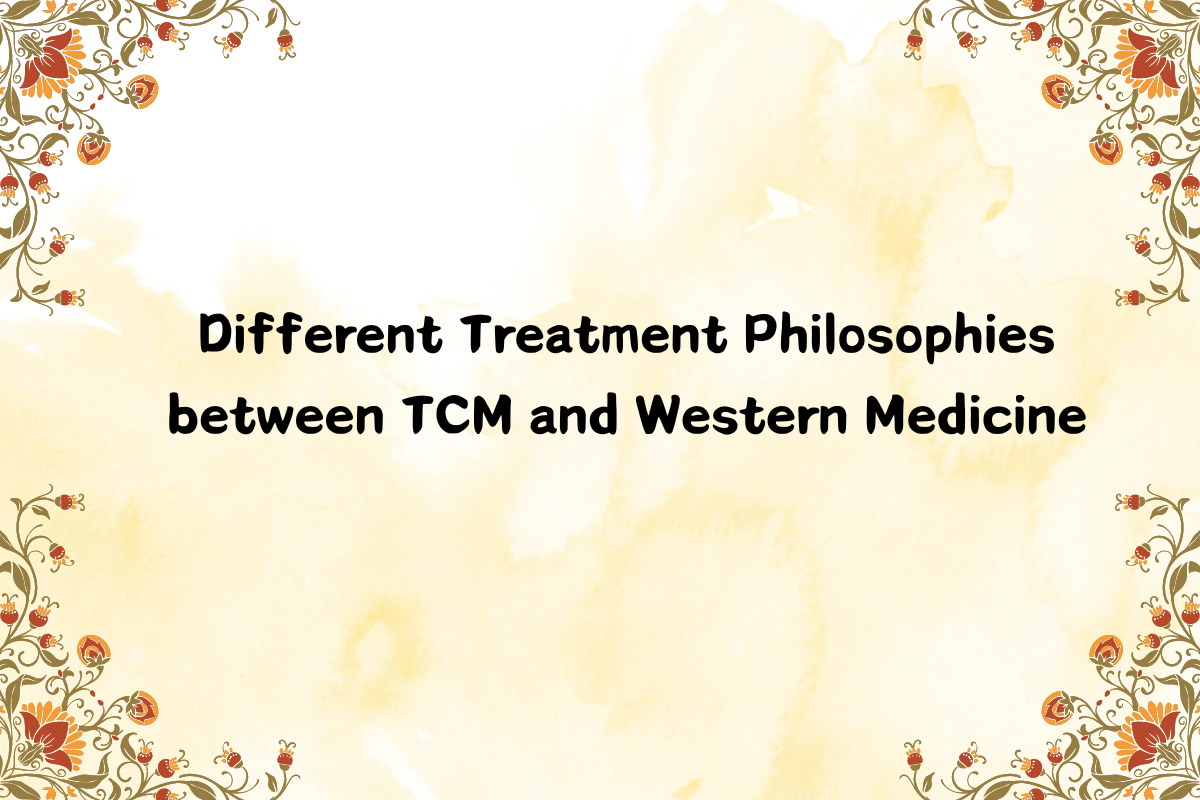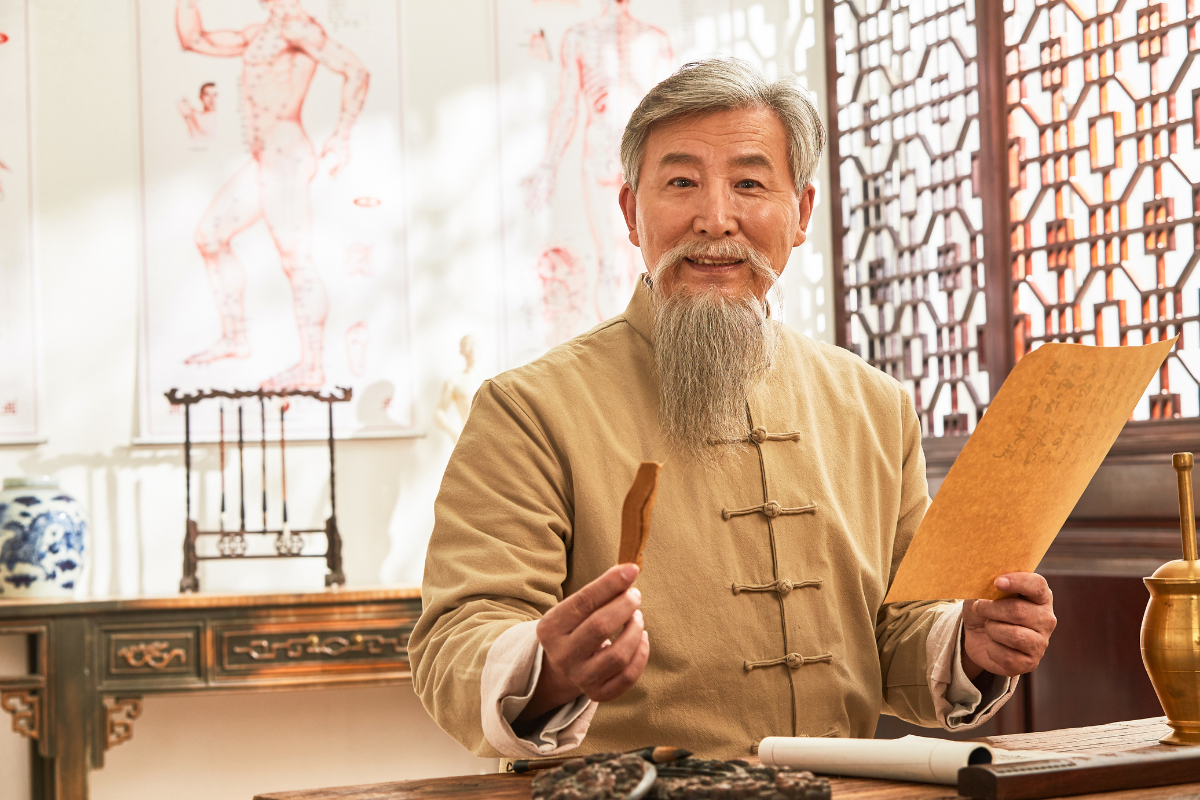Different Treatment Philosophies between TCM and Western Medicine
In this blog post, we will delve into the divergent treatment philosophies between Traditional Chinese Medicine (TCM) and Western Medicine. While both approaches aim to address health issues and promote well-being, they differ significantly in their underlying principles, diagnostic methods, and treatment modalities.

Traditional Chinese Medicine (TCM) Philosophy
TCM is rooted in ancient Chinese philosophy and encompasses holistic principles that emphasize the interconnectedness of the body, mind, and spirit. TCM views health as a state of balance and harmony within the body, achieved through the free flow of Qi (vital energy) along meridians. Diagnosis in TCM involves assessing the overall pattern of disharmony in the body, often through methods such as pulse-taking (脉诊 - mài zhěn), tongue examination (舌诊 - shé zhěn), and questioning about lifestyle and emotional factors. Treatment in TCM aims to restore balance and harmony by using a combination of techniques such as acupuncture (针灸 - zhēn jiǔ), herbal medicine (中药 - zhōng yào), dietary therapy (饮食疗法 - yǐn shí liáo fǎ), and lifestyle 生活方式 (shēng huó fāng shì) adjustments.
生活方式 (shēng huó fāng shì), noun, lifestyle
Examples:
- We should develop a healthy lifestyle.
我们应该养成健康的生活方式。
Wǒmen yīnggāi yǎngchéng jiànkāng de shēnghuó fāngshì. - Her lifestyle is very healthy, she exercises every day.
她的生活方式非常健康,每天都运动。
Tā de shēnghuó fāngshì fēicháng jiànkāng, měitiān dōu yùndòng.

Western Medicine Philosophy
Western Medicine, on the other hand, is grounded in scientific principles and focuses on diagnosing and treating specific diseases or symptoms. It employs a reductionist approach, breaking down the body into its constituent parts and analyzing physiological processes at the molecular level. Diagnosis in Western Medicine relies heavily on laboratory tests, imaging studies, and clinical examinations to identify the underlying cause of illness. Treatment typically involves pharmaceutical interventions, surgical procedures, and other medical interventions targeted at specific symptoms 症状 (zhèng zhuàng) or diseases.
症状 (zhèng zhuàng), noun, symptoms
Examples:
- I have some cold symptoms, such as headache and sore throat.
我有些感冒的症状,比如头痛和喉咙痛。
Wǒ yǒuxiē gǎnmào de zhèngzhuàng, bǐrú tóutòng hé hóulóng tòng. - Last night I suddenly experienced symptoms of stomach ache.
昨晚我突然出现了胃痛的症状。
Zuówǎn wǒ tūrán chūxiànle wèitòng de zhèngzhuàng.

Key Differences
Holistic VS Reductionist Approach: TCM takes a holistic view of health, considering the interconnectedness of the body, mind, and spirit, whereas Western Medicine tends to adopt a reductionist approach, focusing on specific disease processes.
Diagnosis Methods: TCM diagnosis involves evaluating the overall pattern of disharmony in the body, while Western Medicine diagnosis relies more on objective tests and clinical examinations.
Treatment Modalities: TCM treatment emphasizes natural remedies such as acupuncture and herbal medicine, while Western Medicine relies heavily on pharmaceutical drugs and surgical interventions.
Key Sentences:
- I feel some discomfort in my body and I want to see a traditional Chinese doctor.
我感觉体内有些不舒服,想去看中医。
Wǒ gǎnjué tǐnèi yǒuxiē bù shūfú, xiǎng qù kàn zhōngyī. - Okay, I suggest you go to the hospital for a check-up first.
好的,我建议你先去医院做个检查。
Hǎo de, wǒ jiànyì nǐ xiān qù yīyuàn zuò ge jiǎnchá. - I've been trying acupuncture therapy for a while now and I feel it's been very effective.
我已经尝试了一段时间的针灸疗法,感觉效果很好。
Wǒ yǐjīng chángshìle yīduàn shíjiān de zhēnjiǔ liáofǎ, gǎnjué xiàoguǒ hěn hǎo.